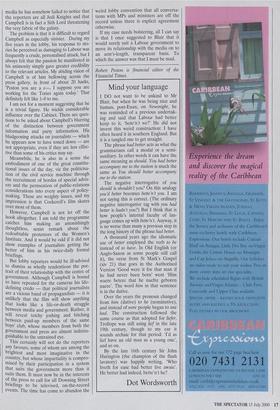Mind your language
I DO not want to be unkind to Mr Blair, but when he was being nice and human, post-Euan, on Newsnight, he was reminded of a previous undertak- ing and said that Labour had better keep to it, bette'n't we?' He did not invent this weird construction: I have often heard it in southern England. But it is a tangled one to get straight.
The phrase had better acts as what the grammarians call a modal or a semi- auxiliary. In other words it can have the same meaning as should. You had better accompany me to the station is much the same as You should better accompany me to the station.
The negative interrogative of you should is shouldn't you? On this analogy you'd better becomes bette'n't you. I am not saying this is correct. (The ordinary negative interrogative tag with you had better is hadn't you?) But I think that is how people's internal faculty of lan- guage comes up with bette'n't. Anyway, it is no worse than many a previous step in the long history of the phrase had better.
A thousand years ago the idiomatic use of better employed the verb to be instead of to have. In Old English (or Anglo-Saxon as some people still call it), the verse from St Mark's Gospel (xiv 21) that goes in the Authorised Version 'Good were it for that man if he had never been born' went 'Him waere betere that he naefre geboren nacre'. The word him in that sentence is in the dative.
Over the years the pronoun changed from him (dative) to he (nominative), and instead of were people began to use had. The construction followed the same course as that adopted for liefer.
Trollope was still using lief in the late 19th century, though to my ear it sounds archaic for that period: 'I'd as lief have an old man as a young one', and so on.
By the late 16th century Sir John Harington (the champion of the flush lavatory) was happily writing, 'Who liveth for ease had better live awaie'. He better had indeed, bette'n't he?
Dot Wordsworth


























































 Previous page
Previous page